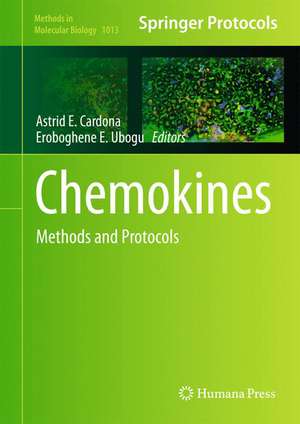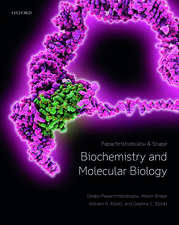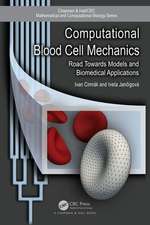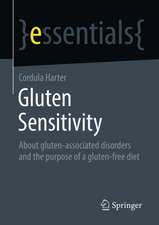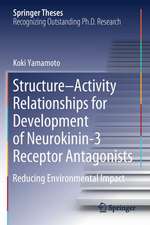Chemokines: Methods and Protocols: Methods in Molecular Biology, cartea 1013
Editat de Astrid E. Cardona, Eroboghene E. Uboguen Limba Engleză Hardback – 27 apr 2013
Practical and easy to use, Chemokines: Methods and Protocols aims to reveal key protocols of functional and descriptive chemokine ligand/receptor assays that will be of practical significance to graduate students, post-doctoral fellows, trainees, and researchers in academia and industry.
| Toate formatele și edițiile | Preț | Express |
|---|---|---|
| Paperback (1) | 697.82 lei 6-8 săpt. | |
| Humana Press Inc. – 23 aug 2016 | 697.82 lei 6-8 săpt. | |
| Hardback (1) | 951.77 lei 6-8 săpt. | |
| Humana Press Inc. – 27 apr 2013 | 951.77 lei 6-8 săpt. |
Din seria Methods in Molecular Biology
- 9%
 Preț: 791.59 lei
Preț: 791.59 lei - 23%
 Preț: 598.56 lei
Preț: 598.56 lei - 20%
 Preț: 882.95 lei
Preț: 882.95 lei -
 Preț: 252.04 lei
Preț: 252.04 lei - 5%
 Preț: 802.69 lei
Preț: 802.69 lei - 5%
 Preț: 729.61 lei
Preț: 729.61 lei - 5%
 Preț: 731.43 lei
Preț: 731.43 lei - 5%
 Preț: 741.30 lei
Preț: 741.30 lei - 5%
 Preț: 747.16 lei
Preț: 747.16 lei - 15%
 Preț: 663.45 lei
Preț: 663.45 lei - 18%
 Preț: 1025.34 lei
Preț: 1025.34 lei - 5%
 Preț: 734.57 lei
Preț: 734.57 lei - 18%
 Preț: 914.20 lei
Preț: 914.20 lei - 15%
 Preț: 664.61 lei
Preț: 664.61 lei - 15%
 Preț: 654.12 lei
Preț: 654.12 lei - 18%
 Preț: 1414.74 lei
Preț: 1414.74 lei - 5%
 Preț: 742.60 lei
Preț: 742.60 lei - 20%
 Preț: 821.63 lei
Preț: 821.63 lei - 18%
 Preț: 972.30 lei
Preț: 972.30 lei - 15%
 Preț: 660.49 lei
Preț: 660.49 lei - 5%
 Preț: 738.41 lei
Preț: 738.41 lei - 18%
 Preț: 984.92 lei
Preț: 984.92 lei - 5%
 Preț: 733.29 lei
Preț: 733.29 lei -
 Preț: 392.58 lei
Preț: 392.58 lei - 5%
 Preț: 746.26 lei
Preț: 746.26 lei - 18%
 Preț: 962.66 lei
Preț: 962.66 lei - 23%
 Preț: 860.21 lei
Preț: 860.21 lei - 15%
 Preț: 652.64 lei
Preț: 652.64 lei - 5%
 Preț: 1055.50 lei
Preț: 1055.50 lei - 23%
 Preț: 883.85 lei
Preț: 883.85 lei - 19%
 Preț: 491.88 lei
Preț: 491.88 lei - 5%
 Preț: 1038.84 lei
Preț: 1038.84 lei - 5%
 Preț: 524.15 lei
Preț: 524.15 lei - 18%
 Preț: 2122.34 lei
Preț: 2122.34 lei - 5%
 Preț: 1299.23 lei
Preț: 1299.23 lei - 5%
 Preț: 1339.10 lei
Preț: 1339.10 lei - 18%
 Preț: 1390.26 lei
Preț: 1390.26 lei - 18%
 Preț: 1395.63 lei
Preț: 1395.63 lei - 18%
 Preț: 1129.65 lei
Preț: 1129.65 lei - 18%
 Preț: 1408.26 lei
Preț: 1408.26 lei - 18%
 Preț: 1124.92 lei
Preț: 1124.92 lei - 18%
 Preț: 966.27 lei
Preț: 966.27 lei - 5%
 Preț: 1299.99 lei
Preț: 1299.99 lei - 5%
 Preț: 1108.51 lei
Preț: 1108.51 lei - 5%
 Preț: 983.72 lei
Preț: 983.72 lei - 5%
 Preț: 728.16 lei
Preț: 728.16 lei - 18%
 Preț: 1118.62 lei
Preț: 1118.62 lei - 18%
 Preț: 955.25 lei
Preț: 955.25 lei - 5%
 Preț: 1035.60 lei
Preț: 1035.60 lei - 18%
 Preț: 1400.35 lei
Preț: 1400.35 lei
Preț: 951.77 lei
Preț vechi: 1160.70 lei
-18% Nou
Puncte Express: 1428
Preț estimativ în valută:
182.15€ • 188.17$ • 151.59£
182.15€ • 188.17$ • 151.59£
Carte tipărită la comandă
Livrare economică 25 martie-08 aprilie
Preluare comenzi: 021 569.72.76
Specificații
ISBN-13: 9781627034258
ISBN-10: 1627034250
Pagini: 245
Ilustrații: XI, 238 p. 37 illus., 19 illus. in color.
Dimensiuni: 178 x 254 x 22 mm
Greutate: 0.63 kg
Ediția:2013
Editura: Humana Press Inc.
Colecția Humana
Seria Methods in Molecular Biology
Locul publicării:Totowa, NJ, United States
ISBN-10: 1627034250
Pagini: 245
Ilustrații: XI, 238 p. 37 illus., 19 illus. in color.
Dimensiuni: 178 x 254 x 22 mm
Greutate: 0.63 kg
Ediția:2013
Editura: Humana Press Inc.
Colecția Humana
Seria Methods in Molecular Biology
Locul publicării:Totowa, NJ, United States
Public țintă
Professional/practitionerCuprins
The Fine Balance of Chemokines During Disease: Trafficking, Inflammation, and Homeostasis.- Chemokine-Dependent Signaling Pathways in the Peripheral Nervous System.- Multispectral Imaging and Automated Laser Capture Microdissection of Human Cortical Neurons: A Quantitative Study of CXCR4 Expression.- Chemokine Receptors and Neural Stem Cells.- Chemokine Receptor Interactions with Virus-Like Particles.- Chemokine Receptor Antagonist Development.- A Novel Approach to Quantify G Protein-Coupled Receptor Dimerization Equilibrium Using Bioluminescence Resonance Energy Transfer.- Unraveling Chemokine and Chemokine Receptor Expression Patterns Using Genetically Engineered Mice.- Zebrafish as a Model to Study Chemokine Function.- Inflammatory Macrophage Migration in Experimental Autoimmune Encephalomyelitis.- Visualizing Chemokine-Dependent T Cell Activation and Migration in Response to Central Nervous System Infection.- Epigenetic Regulation of Chemokine/Chemokine Receptor Expression.- Using Fluorescent Chemokine Uptake to Detect Chemokine Receptors by Fluorescent Activated Cell Sorting.- Live Cell Imaging of Chemotactic Dendritic Cell Migration in Explanted Mouse Ear Preparations.- Studying Extracellular Signaling Utilizing a Glycoproteomic Approach: Lectin Blot Surveys, a First and Important Step.
Textul de pe ultima copertă
Chemokines constitute a large family of structurally similar cytokines that contain a signature of conserved cysteine residues joined by disulfide bridges. Binding of chemokines to specific G protein-coupled receptors followed by downstream signaling defines their biological function. Initially, chemoattraction was the key function linked to chemokines/chemokine receptors; however, in recent years, it has become clear that chemokine ligand-receptor interactions can also modulate cellular activation, survival, and proliferation, among other functions in homeostatic and diseased states. Importantly, major advances in our understanding of chemokine biology have led to chemokine receptors becoming specific therapeutic targets with great potential. In Chemokines: Methods and Protocols, expert researchers provide practical information regarding experimental models and state of the art protocols used to delineate chemokine/chemokine receptor function and their applications in health and disease. Written in the highly successful Methods in Molecular Biology series format, chapters include introductions to their respective topics, lists of the necessary materials and reagents, step-by-step, readily reproducible laboratory protocols, and tips on troubleshooting and avoiding known pitfalls.
Practical and easy to use, Chemokines: Methods and Protocols aims to reveal key protocols of functional and descriptive chemokine ligand/receptor assays that will be of practical significance to graduate students, post-doctoral fellows, trainees, and researchers in academia and industry.
Practical and easy to use, Chemokines: Methods and Protocols aims to reveal key protocols of functional and descriptive chemokine ligand/receptor assays that will be of practical significance to graduate students, post-doctoral fellows, trainees, and researchers in academia and industry.
Caracteristici
Features experimental models and state of the art protocols Delineates chemokine/chemokine receptor function and their applications in health and disease Includes key tips and expert implementation advice to ensure successful results Includes supplementary material: sn.pub/extras
